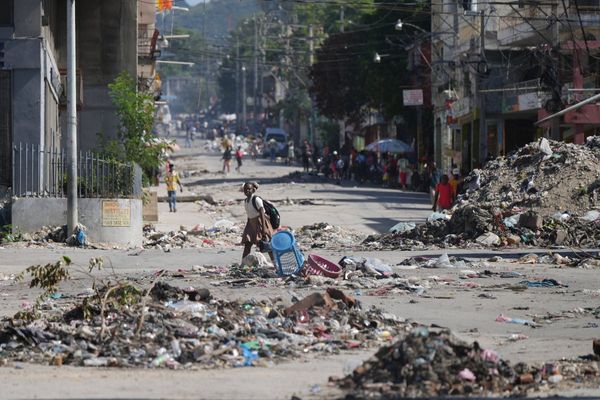
This is an extract from Humanity’s Moment: A Climate Scientist’s Case for Hope by Joëlle Gergis, available now.
Perhaps the most heavily criticised outcome of COP26 was not only that the current pledges are still insufficient, but the fact that they still include plans to burn fossil fuels well past what is possible to limit warming to 1.5°C above pre-industrial levels. The IPCC report clearly states that we know we need to reduce greenhouse gas emissions by at least 50% between now and 2030 to keep this goal within reach.
The 2021 Global Carbon Budget report estimates that the world has around a decade of burning carbon at the current rate if humanity hopes to avoid catastrophic warming. Despite draft text in the Glasgow Climate Pact including a clause about “accelerating efforts towards the phase out of unabated coal power and inefficient fossil fuel subsidies”, members failed to agree on a “phase out” of coal use, following last-minute objections by India and China that succeeded in watering down the language to a far weaker “phase down”.
Nonetheless, despite the compromised phrasing, it is important to note that it was the first time that a United Nations climate change declaration directly mentioned the need to rapidly reduce the use of fossil fuels, something that nations like Saudi Arabia and others have stripped out in the past. The international community has now very clearly signalled to financial markets that the fossil fuel era is coming to an end.
While acknowledging the critical diplomatic significance of the achievement, we are dealing with an emergency situation where actions must speak louder than words. Clearly there is still a real disconnect between the political response to climate change and the scientific reality we face. While it was very positive to see major powers like the United States and the United Kingdom bring significant commitments to reduce emissions this decade, other countries either did not increase their ambition at all, or only did so in a negligible way.
For example, China, now the world’s largest greenhouse gas emitter, responsible for around a third of global emissions, only agreed to increase its use of renewable energy to 25% by 2030, up from its previous pledge of 20%. While its Nationally Determined Contribution submission mentions the phase out of coal and its intention to stop building new coal-fired power projects overseas, it also stated “it is unlikely to fundamentally change the coal-dominated energy mix in the short term” and did not formally sign up to the clean energy transition statement.
Further evidence that political leaders aren’t quite ready to give up fossil fuels was also obvious from an effort to phase out oil and gas production, which only received limited support on the sidelines of the summit. Despite the dominant role of oil and gas in fuelling climate change, the Beyond Oil and Gas Alliance garnered just 12 members, including Denmark, Costa Rica and France.
The IPCC report very clearly states that the large-scale burning of fossil fuels is the primary cause of climate change. Virtually all of the observed global warming we have experienced so far has been driven by emissions from human activities. According to the 2021 Global Carbon Budget report, between 1960 and 2020, around 82% of carbon dioxide emissions came from the burning of fossil fuels, with the remaining 18% generated from land use changes like deforestation and the degradation of ecosystems.
Total anthropogenic emissions more than doubled over the past 60 years, with almost half of the carbon dioxide accumulated in the atmosphere emitted since 1990. The burning of coal was the largest contributor to these emissions, closely followed by oil and gas. As the latest IPCC assessment highlighted, greenhouse gas concentrations are now at their highest levels in at least 2 million years, leading to rates of warming unprecedented in thousands of years, with no sign of slowing down.
Despite the Glasgow Climate Pact stating that it “expresses alarm and utmost concern that human activities have caused around 1.1°C of warming to date”, the science is very clearly telling us we are still nowhere near doing enough to reduce greenhouse gas emissions. So what exactly is going on?
In a nutshell, there is still entrenched reluctance in many parts of the world to phase out coal, oil and gas. Without genuine commitments to eliminate the burning of fossil fuels — the factor responsible for the lion’s share of the problem we face — we will lock in dangerous levels of climate change. Scientifically speaking, it is as simple as that. But when you consider things politically, things become much more complex.
According to the International Monetary Fund, in 2020 governments spent US$450 billion in direct subsidies to the fossil fuel industry — four and a half times more than developed countries are willing to spend on financing climate change adaptation in vulnerable regions. Instead, nations like Australia, the United States and China are basing their policies on unproven, highly subsidised carbon capture and storage technology rather than investing in renewable energy solutions that exist today.
Most alarmingly, plans to continue to expand the fossil fuel industry are still underway — the United Kingdom currently has at least 40 new projects in the pipeline, including plans to develop the controversial Cambo offshore oilfield in the North Sea. In the United States, President Joe Biden’s administration’s call for a pause on new oil and gas leases on federal land and water was blocked in the federal court after 14 state governments, including Louisiana and Texas, legally challenged the move.
As of November 2021, Australia had 72 new coal projects and 44 new gas projects under development, including the exploration of the new Beetaloo and Canning gas basins in northern Australia, which are being heavily supported by government subsidies. These projects would more than double Australia’s gas and coal production, resulting in 1.7 billion tonnes of greenhouse gases each year, equivalent to more than 200 coal-fired power stations, or twice the emissions of global aviation.
And this only includes projects currently under development, not prospective projects where no publicly available information exists to estimate the impact of their emissions. This colossal expansion of the fossil fuel industry is entirely inconsistent with the nation’s stated target of achieving net-zero emissions by 2050.
While it is clear that the fossil fuel industry still heavily influences governments the world over, signs of resistance are emerging. One of the positive developments to come out of COP26 was an agreement to phase out coal-fired electricity in the 2030s for major economies and the 2040s for developing nations. While 40 countries, including the United Kingdom and Germany, signed the pledge, the world’s biggest coal-dependent economies of the United States, China, India and Australia are missing from the deal.
Similarly, another agreement to end all overseas finance for “unabated” fossil fuel projects — those run without carbon capture and storage — by the end of 2022 was only formally signed by 31 governments and financial institutions, including the United Kingdom, United States and Canada. Significantly, neither statement was signed by China, Japan, India or Australia, some of the world’s largest fossil fuel emitters and exporters.
This reflects the fact that our political leaders are still protecting corporate interests that intend to keep the fossil fuel industry on life support until the bitter end. Without genuine commitments to phase out the burning of fossil fuels, we are not serious about addressing climate change. The simple truth is that unless we consign coal, oil and gas to history, we will destabilise our climate and reconfigure life on the planet as we know it.
The most confronting aspect of COP26 was the overwhelming presence of fossil fuel lobbyists representing major oil and gas companies like Shell and British Petroleum. More than 500 people with links to the fossil fuel industry attended, contributing to at least 27 country delegations including Australia, Canada and Russia. Together, they were the largest delegation present at the COP26 summit — more than any single country present at the meeting — far outnumbering the delegations from countries that are worst affected by climate change. According to Fijian Prime Minister Frank Bainimarama, Pacific Island negotiators were outnumbered by fossil fuel representatives by more than 12 to one.
To me as a climate scientist, the presence of hundreds of people openly promoting the continued expansion of the fossil fuel industry alongside people literally being displaced from their homes felt completely immoral. How can a climate summit pleading for world leaders to urgently avert planetary disaster be crawling with fossil fuel lobbyists? It’s like the tobacco industry showing up to a lung cancer conference to promote their products. It’s easy to feel demoralised by the fact that our political leadership is failing us. In the face of such insidious forces, is there anything any of us can ever really do to turn this around?
In the days following COP26, I thought long and hard about the leadership failure we witnessed at Glasgow. Like many people, I started to feel cynical and despairing about what unfolded. Hollow promises in the face of a global emergency; the cruelty of greed; the sting of knowing you’ve missed the moment. Ugandan youth climate activist Vanessa Nakate clearly summed up the implications of inaction, saying: “You cannot adapt to lost cultures, you cannot adapt to lost traditions, you cannot adapt to lost history, you cannot adapt to starvation. You cannot adapt to extinction.” Addressing protesters gathered in Glasgow, she told the crowd: “Leaders rarely have the courage to lead. It takes citizens, people like you and me, to rise up and demand action. And when we do that in great enough numbers, our leaders will move.”
And then something finally clicked. I realised that human history is an endless tug of war for social justice: a struggle between those wanting to maintain the status quo that protects the interests of a few, and others who fight for equality for all. This struggle has been part of every great victory in our history. From the abolition of slavery to the fight for women’s rights, people have stood up against injustice and said enough is enough.
Yes, our political leaders collectively failed us at Glasgow, but in the pavilions and out on the streets, leadership of another kind was also there thriving — our Indigenous leaders, innovators, young people, entrepreneurs, our environmentalists, scientists, artists, activists — visionaries of every stripe, rising to the biggest challenge humanity has ever faced, in any way that they could.
Despite the travel restrictions posed by a deadly pandemic, people gathered from every corner of the world to be part of this critical moment in human history. A colourful procession of 100,000 demonstrators filled the streets of Glasgow to demand more action inside the negotiation rooms. But this was just one part of the Global Day of Action for Climate Justice events that took place on November 6, 2021 in more than 100 countries around the world, from Kenya to Canada, China to Brazil, Norway to Australia. And that’s when it hit me — we are witnessing the biggest social movement of our time. A time of true global citizenry, driven by our passion to save the one thing that sustains us all: our Earth.
At the COP26 opening ceremony, Kenyan climate activist Elizabeth Wathuti powerfully reminded us of our shared humanity, asking world leaders to: “Please open your hearts. If you allow yourself to feel it, the heartbreak and the injustice is hard to bear.” In times of crisis, we don’t look into each other’s eyes and see our differences; we recognise our shared humanity. We feel each other’s pain, and do whatever we can to ease each other’s suffering. We care about injustice and about righting the wrongs of the past. We understand that we need to be the type of person that strives to be compassionate, loving and kind.
When our moral compass tells us that we have lost our way, we let our heart guide us back to what feels right and true. When we align our values with our actions, we are unstoppable. The force for good has the power to change the course of history; it always has, and it always will. Right now, we need to recognise that collectively we have the power to change our political leadership, wherever we find ourselves in the world. Every battle won is a step closer to winning the war.







